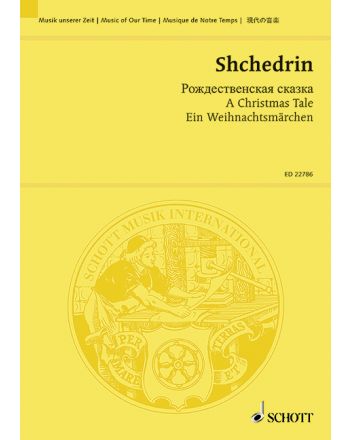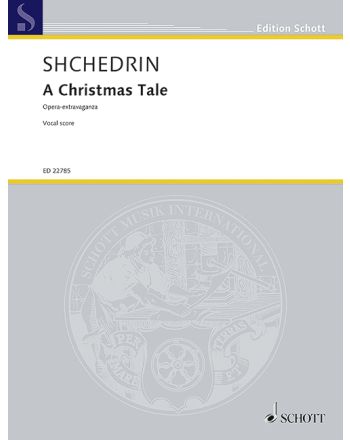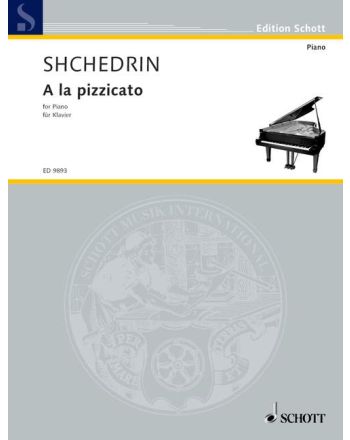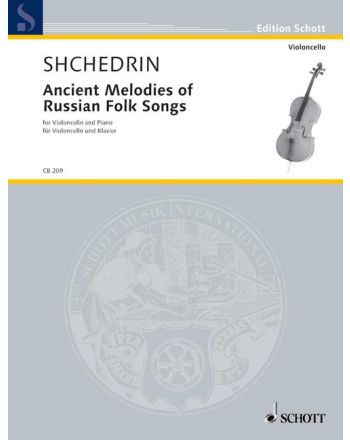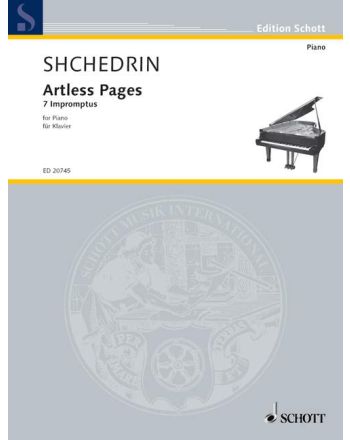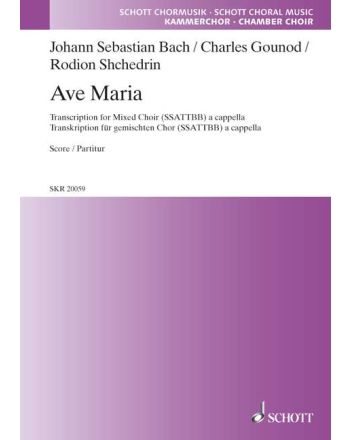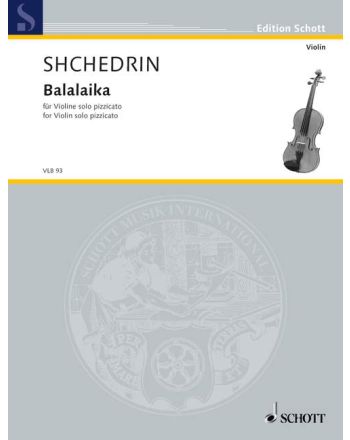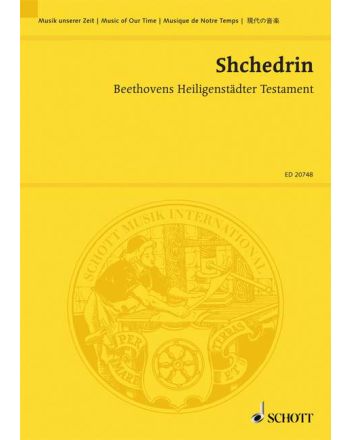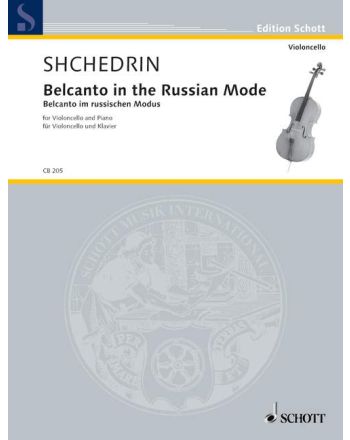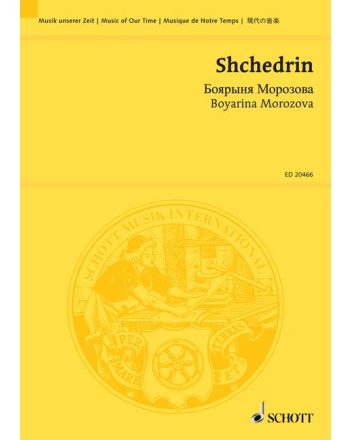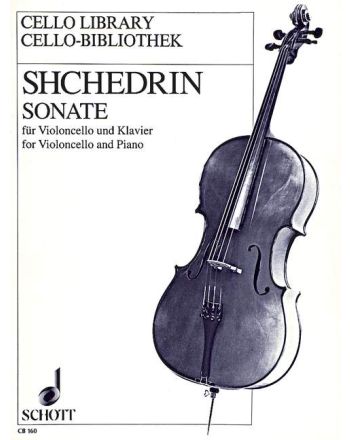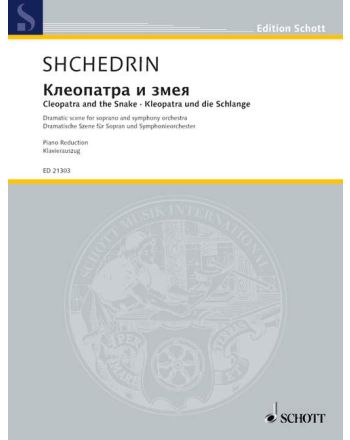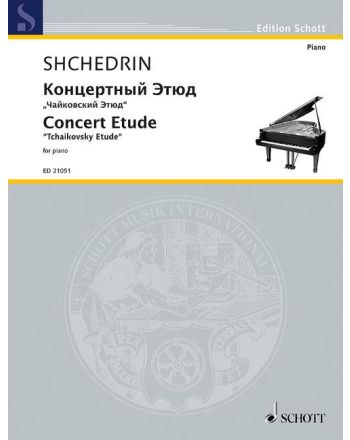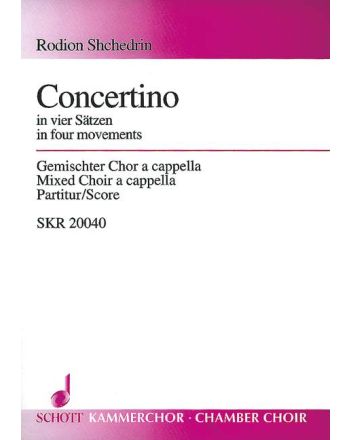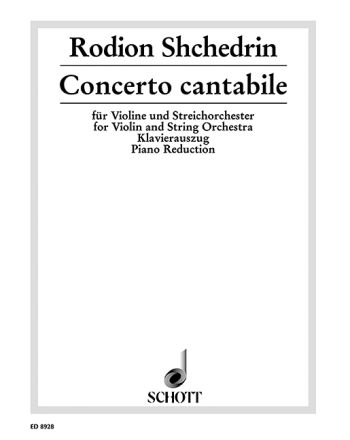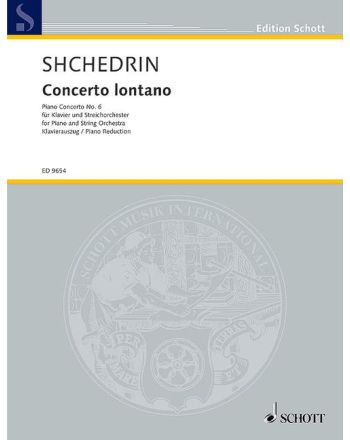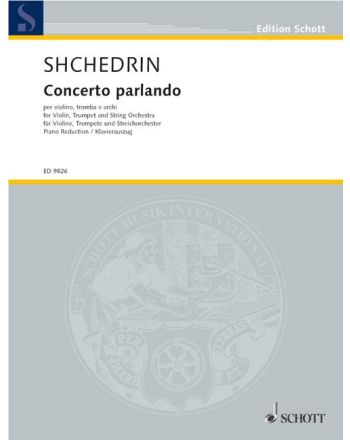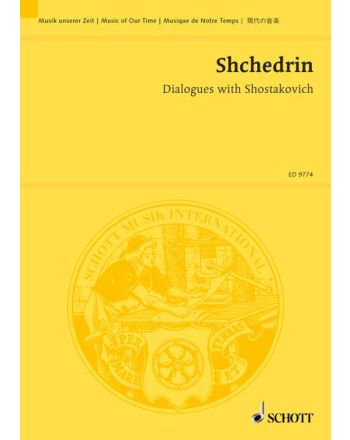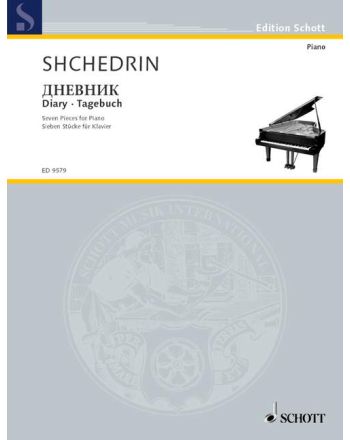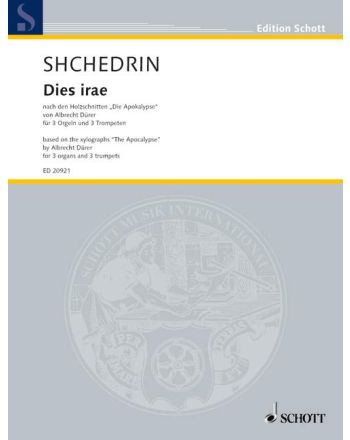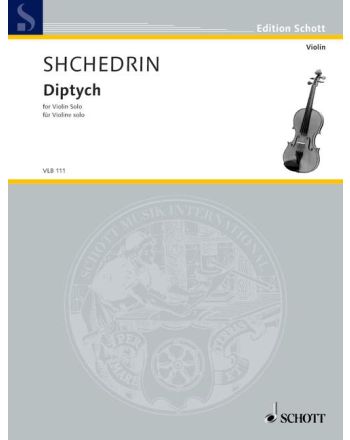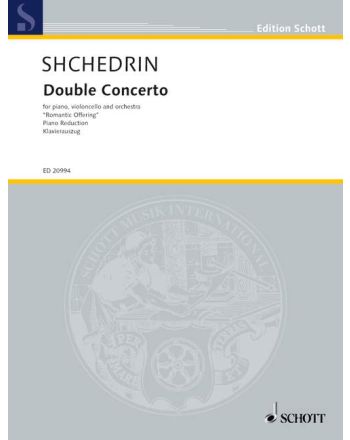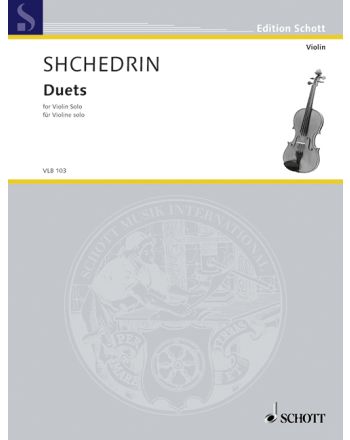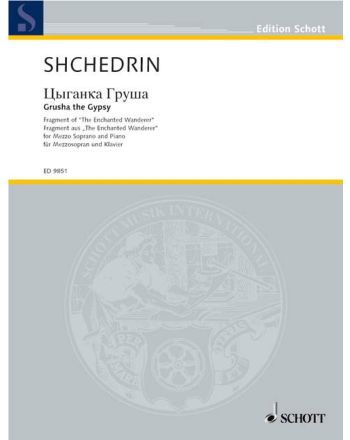
Rodion Shchedrin
About Rodion Shchedrin
I still today continue to be convinced that the decisive factor for each composition is intuition. As soon as composers relinquish their trust in this intuition and rely in its place on musical ‘religions’ such as serialism, aleatoric composition, minimalism or other methods, things become problematic. (Rodion Shchedrin)
Rodion Shchedrin was born on 16 December 1932 as the son of a composer and music teacher in Moscow. He attended the Moscow Choral School and subsequently studied at the Moscow Conservatory with Jurij Schaporin (composition) and Jakow Flier (piano), graduating with distinction in 1955. Despite his ability as a concert pianist, Shchedrin made the decision at an early stage to devote his career to composition and wrote his first ambitious works in his early twenties. In 1958, he married the prima ballerina Maja Plisetskaya. He experienced initial success as a composer with the premiere of his ballet “Carmen Suite” at the Moscow Bolschoi Theatre in 1967. He was professor for composition at the Moscow Conservatory between 1964 and 1969. In 1968, Shchedrin refused to sign an open letter in support of the invasion of troops from the Warsaw Pact into former Czechoslovakia. For over a decade, he was chairman of the Composers’ Association of the Russian Federation as the successor to Dmitri Shostakovitsch according to the latter composer’s expressive wish. In 1982, he visited the festival Munich Piano Summer for the first time. Following the end of the dictatorial regime in the Soviet Union, it was finally possible for Shchedrin, who was never a member of the Communist Party, to participate intensively in international musical life. Since 1992, the composer has divided his time between Munich and Moscow.
Shchedrin has succeeded in combining traditional and new forms with the utilisation of all modern compositional processes – including aleatory and serial techniques. His enthusiasm for Russian folk music and classical music, poetry and literature permeates his works and characterises him as an originally Russian composer. This particularly applies to the third and fifth Concertos for Orchestra, the Old Russian Circus Music (1989) and the Four Russian Songs (1998). Other instrumental works reflect Shchedrin’s pianistic skills: the six Piano Concertos and other solo compositions for piano such as Questions (eleven pieces for piano) from 2003 which is dedicated to Olli Mustonen. Shchedrin performed as the soloist in a number of these works. The composer particularly demonstrates the artistic utilisation of parody techniques in his chamber music works. In Balalaika for solo violin (1997), the string instrument is taken as the basis for a parody on experimental performance techniques which escalates into absurd virtuosity.
With his opera “The Dead Souls” (based on Gogol, 1976) and the ballets “Anna Karenina” (based on Tolstoy, first performance 1972), “The Seagull” (1979) and “Lady with the Little Dog” (both by Chekhov, 1985), Shchedrin brought Russian literary classics to the music theatre stage of the Moscow Bolschoi Theatre. The opera Lolita is also based on a Russian contribution to world literature: the scandalous novel of the same name by Vladimir Nabokov. The libretto to this opera, which received its first performance in Stockholm in 1994, originated from the workshop of the composer. Shchedrin's fairytale opera A Christmas Tale (2016), premiered at the Mariinsky Theatre in St. Petersburg, draws on a narrative by Czech author Božena Nemtsova, which references fairytales such as Star Money, Mother Hulda, Cinderella and Snow White. In the vocal works Meine Zeit, mein Raubtier for tenor, female narrator and piano (2002) based on texts by Ossip Mandelstam and the chorus opera Boyarina Morozova (2006), the phrasing of the Russian language lends the music its character – in the first-mentioned work in the form of a chamber music-like stringent dramaturgy and in the latter work as a large-scale conceived Russian drama depicting life and suffering.
Rodion Shchedrin has received numerous prizes and awards. In 1983, he was made the honorary member of the Academy of the Fine Arts in the German Democratic Republic, two years later a honorary member of the International Music Council and in 1989 a member of the Academy of the Arts in Berlin. In 1992, the Russian President Boris Jelzin awarded the composer the State Prize for his choral work The Sealed Angel. A year later, Shchedrin received the Dmitri Shostakovitsch Prize and in 1995 the Crystal Award of the World Economic Forum in Davos. In 2002, he was named as Composer of the Year by the Pittsburgh Symphony Orchestra. In the same year, he was presented with the Russian Federation State Order. In 2005, he was created as honorary professor at the St. Petersburg Conservatory and in 2008 at the Central Conservatory of Music in Beijing. Rodion Shchedrin was awarded the Russian State Order 2nd Class “for services to his country” in 2007.
Worklist
Gallery



Chronology
Mitglied der Akademie der Künste Berlin
"Khorovody" (4. Konzert für Orchester)
Uraufführung Konzert für Violoncello und Orchester ("sotto voce concerto") in London
Uraufführung "Trumpet Concerto" in Pittsburgh
Uraufführung "Concerto Cantabile" in Zürich
Uraufführung "A Christmas Tale" in St. Petersburg
Products
-
Composer: Rodion ShchedrinMedia Type: Sheet musicBrand: Sikorski
Instrumentation: pianoProduct number: SIK2306Special Price £17.99 Regular Price £23.99Not in stock, but can be ordered - usually despatched (or ready for collection) within 7 days -
für KlavierComposer: Rodion ShchedrinArranger: Mikhail PletnevMedia Type: Sheet musicBrand: Sikorski
Instrumentation: pianoProduct number: SIK2398Special Price £9.38 Regular Price £12.50Not in stock, but can be ordered - usually despatched (or ready for collection) within 7 days -
Bd 2: Nr. 13-24Composer: Rodion ShchedrinMedia Type: Sheet musicBrand: Sikorski
Instrumentation: pianoProduct number: SIK2136 BSpecial Price £24.38 Regular Price £32.50In stock - usually despatched (or ready for collection) within 1 working day -
Bd 1: Nr. 1-12Composer: Rodion ShchedrinMedia Type: Sheet musicBrand: Sikorski
Instrumentation: pianoProduct number: SIK2136 ASpecial Price £21.74 Regular Price £28.99In stock - usually despatched (or ready for collection) within 1 working day -
für KlaviertrioComposer: Rodion ShchedrinMedia Type: Sheet musicEdition: Set of partsBrand: Sikorski
Instrumentation: piano trioProduct number: SIK2235Special Price £14.63 Regular Price £19.50Not in stock, but can be ordered - usually despatched (or ready for collection) within 7 days -
für Flöte, Oboe und KlarinetteComposer: Rodion ShchedrinMedia Type: Sheet musicEdition: Performing scoreBrand: Sikorski
Instrumentation: flute, oboe, clarinetProduct number: SIK2370Special Price £17.24 Regular Price £22.99Not in stock, but can be ordered - usually despatched (or ready for collection) within 7 days -
für hohe Stimme und KlavierComposer: Rodion ShchedrinMedia Type: Sheet musicBrand: Sikorski
Instrumentation: high voice and pianoProduct number: SIK2148Special Price £10.13 Regular Price £13.50Not in stock, but can be ordered - usually despatched (or ready for collection) within 7 days -
Opera-extravaganza in 2 actsComposer: Rodion ShchedrinEdition: Study scoreSeries: Music Of Our Time
A Christmas Tale
Brand: Schott Music
Product number: ED 22786Product TypeAs low as £39.99 -
Opera-extravaganza in 2 actsComposer: Rodion ShchedrinSeries: Edition Schott
A Christmas Tale
Brand: Schott Music
Product number: ED 22785Product TypeAs low as £40.99 -
Composer: Rodion ShchedrinSeries: Edition Schott
Brand: Schott Music
Instrumentation: pianoProduct number: ED 9893Product TypeAs low as £8.50 -
Russian EditionComposer: Rodion ShchedrinMedia Type: Sheet musicSeries: Edition Schott
Brand: Schott Music
Instrumentation: pianoLanguage: RussianProduct number: ED 9893-88Special Price £8.99 Regular Price £11.99Not in stock, but can be ordered -
(Melodies from Rimsky-Korsakov's anthology "100 Russian Folk Songs")Composer: Rodion ShchedrinSeries: Edition Schott
Cello Library
Brand: Schott Music
Instrumentation: cello and pianoProduct number: CB 209Product TypeAs low as £21.50 -
Ballet in three acts£18.50Not in stock, but can be ordered - usually despatched (or ready for collection) within 7 days
-
7 ImpromptusComposer: Rodion ShchedrinSeries: Edition Schott
Brand: Schott Music
Instrumentation: pianoProduct number: ED 20745Product TypeAs low as £16.13 -
7 Impromptus - Russian EditionComposer: Rodion ShchedrinMedia Type: Sheet musicSeries: Edition Schott
Brand: Schott Music
Instrumentation: pianoLanguage: RussianProduct number: ED 20745-88Special Price £14.24 Regular Price £18.99Not in stock, but can be ordered -
Transcription for mixed choir a cappellaComposer: Johann Sebastian BachArranger: Charles Gounod | Rodion ShchedrinEdition: PartiturSeries: Schott Chamber Choir
Brand: Schott Music
Instrumentation: mixed choirProduct number: SKR 20059Product TypeAs low as £4.88 -
Composer: Rodion ShchedrinSeries: Edition Schott
Violin Library
Brand: Schott Music
Instrumentation: violinProduct number: VLB 93Product TypeAs low as £8.50 -
für Klarinette und KlavierComposer: Rodion ShchedrinArranger: K. MjulbergMedia Type: Sheet musicBrand: Sikorski
Instrumentation: clarinet, pianoProduct number: SIK6320Special Price £10.49 Regular Price £13.99Not in stock, but can be ordered - usually despatched (or ready for collection) within 7 days -
Symphonic Fragment for OrchestraComposer: Rodion ShchedrinEdition: Study scoreBrand: Schott Music
Instrumentation: orchestraProduct number: ED 20748Product TypeAs low as £16.50 -
Composer: Rodion ShchedrinSeries: Edition Schott
Cello Library
Brand: Schott Music
Instrumentation: cello and pianoProduct number: CB 205Product TypeAs low as £12.99 -
The life and torment of Boyarina Morozova and her sister Princess UruzovaComposer: Rodion ShchedrinEdition: Full and study scoreSeries: Music Of Our Time
Boyarina Morozova
Brand: Schott Music
Instrumentation: 4 soloists, mixed choir, trumpet, timpani and percussionProduct number: ED 20466Product TypeAs low as £39.99 -
The Life and Sufferings of Boyarina Morozova and Her Sister Princess UrusovaComposer: Rodion ShchedrinInterpreter: Mikhail Davydov | Mikhail Dunayev | Veronika Dzhioeva | Andrew Goodwin | Viktor Grishin | Larisa Kostyuk | Kirill SoldatovConductor: Boris TevlinMedia Type: CDBrand: Wergo
Product number: WER 67002£24.99Not in stock, but can be ordered - usually despatched (or ready for collection) within 7 days -
Composer: Georges Bizet | Rodion ShchedrinMedia Type: Sheet musicEdition: Piano scoreBrand: Zen-On
Instrumentation: OrchestraLanguage: English, JapaneseProduct number: ZO 8001046£27.50Not in stock, but can be ordered - usually despatched (or ready for collection) within 7 days -
Ballet£18.50Not in stock, but can be ordered - usually despatched (or ready for collection) within 7 days
-
Nach Georges BizetComposer: Rodion ShchedrinMedia Type: Sheet musicEdition: Miniature scoreBrand: Sikorski
Instrumentation: orchestraProduct number: SIK2304Special Price £16.88 Regular Price £22.50Not in stock, but can be ordered - usually despatched (or ready for collection) within 7 days -
Composer: Rodion ShchedrinSeries: Cello Library
Brand: Schott Music
Instrumentation: cello and pianoProduct number: CB 160Product TypeAs low as £19.88 -
Composer: Rodion ShchedrinMedia Type: Sheet musicEdition: Study scoreBrand: Boosey & Hawkes
Instrumentation: orchestraProduct number: BH 2331Special Price £14.63 Regular Price £19.50Not in stock, but can be ordered - usually despatched (or ready for collection) within 7 days -
Dramatic scene for soprano and symphony orchestraComposer: Rodion ShchedrinBrand: Schott Music
Instrumentation: soprano and orchestraProduct number: ED 21303Product TypeAs low as £16.49 -
Dramatic scene for soprano and symphony orchestra- Russian EditionComposer: Rodion ShchedrinMedia Type: Sheet musicSeries: Edition Schott
Brand: Schott Music
Instrumentation: soprano and orchestraLanguage: RussianProduct number: ED 21303-88Special Price £15.38 Regular Price £20.50Not in stock, but can be ordered -
Tchaikovsky EtudeComposer: Rodion ShchedrinEdition: Separate editionSeries: Edition Schott
Brand: Schott Music
Instrumentation: pianoProduct number: ED 21051Product TypeAs low as £11.24 -
in four movementsComposer: Rodion ShchedrinEdition: Choral scoreSeries: Schott Chamber Choir
Brand: Schott Music
Instrumentation: mixed choir (SATB, also divided)Product number: SKR 20040Product TypeAs low as £5.63 -
for violoncello and orchestraComposer: Rodion ShchedrinMedia Type: Sheet musicEdition: Study scoreSeries: Music Of Our Time
Konzert
Brand: Schott Music
Instrumentation: cello and orchestraProduct number: ED 8799Special Price £26.24 Regular Price £34.99In stock - usually despatched (or ready for collection) within 1 working day -
for Violoncello and OrchestraComposer: Rodion ShchedrinMedia Type: Sheet musicEdition: Piano reduction with solo partSeries: Konzert
Brand: Schott Music
Instrumentation: cello and orchestraProduct number: ED 8283Special Price £31.88 Regular Price £42.50Not in stock, but can be ordered - usually despatched (or ready for collection) within 7 days -
für Violine und StreichorchesterComposer: Rodion ShchedrinEdition: Piano reduction with solo partSeries: Concerto cantabile
Brand: Schott Music
Instrumentation: violin and string orchestraProduct number: ED 8928Product TypeAs low as £22.49 -
für Viola mit Streichorchester und HarfeComposer: Rodion ShchedrinMedia Type: Sheet musicEdition: Piano reduction with solo partSeries: Concerto dolce
Brand: Schott Music
Instrumentation: viola with string orchestra and harpProduct number: ED 8970Special Price £20.63 Regular Price £27.50Not in stock, but can be ordered - usually despatched (or ready for collection) within 7 days -
Piano Concerto No.6Composer: Rodion ShchedrinEdition: for 2 pianosSeries: Edition Schott
Concerto lontano
Brand: Schott Music
Instrumentation: piano and string orchestraProduct number: ED 9654Product TypeAs low as £34.99 -
per violino, tromba e archiComposer: Rodion ShchedrinEdition: Piano reduction with solo partsSeries: Edition Schott
Concerto parlando
Brand: Schott Music
Instrumentation: violin, trumpet and string orchestraProduct number: ED 9826Product TypeAs low as £20.50 -
A collection of new pieces for pianoMedia Type: Sheet musicBrand: Schott Music
Instrumentation: pianoLanguage: EnglishProduct number: ED 21470Special Price £9.74 Regular Price £12.99Not in stock, but can be ordered - usually despatched (or ready for collection) within 7 days -
Symphonic EtudesComposer: Rodion ShchedrinEdition: Study scoreBrand: Schott Music
Instrumentation: orchestraProduct number: ED 9774Product TypeAs low as £18.74 -
Seven PiecesComposer: Rodion ShchedrinSeries: Edition Schott
Brand: Schott Music
Instrumentation: pianoProduct number: ED 9579Product TypeAs low as £11.24 -
based on the "Apocalypse" woodcuts by Albrecht DürerComposer: Rodion ShchedrinEdition: Score and partsSeries: Edition Schott
Brand: Schott Music
Instrumentation: 3 organs and 3 trumpetsProduct number: ED 20921Product TypeAs low as £38.99 -
Composer: Rodion ShchedrinSeries: Edition Schott
Violin Library
Brand: Schott Music
Instrumentation: violinProduct number: VLB 111Product TypeAs low as £8.50 -
for piano, violoncello and orchestraComposer: Rodion ShchedrinEdition: Piano reduction with solo partsSeries: Edition Schott
Double Concerto
Brand: Schott Music
Instrumentation: piano, cello and orchestraProduct number: ED 20994Product TypeAs low as £47.99 -
Composer: Rodion ShchedrinSeries: Edition Schott
Violin Library
Brand: Schott Music
Instrumentation: violin soloProduct number: VLB 103Product TypeAs low as £12.99 -
Zum 300. Geburtstag von Johann Sebastian BachComposer: Rodion ShchedrinMedia Type: Sheet musicBrand: Sikorski
Instrumentation: violinProduct number: SIK2344Special Price £9.38 Regular Price £12.50Not in stock, but can be ordered - usually despatched (or ready for collection) within 7 days -
for organ and sopranino recorderComposer: Rodion ShchedrinMedia Type: Sheet musicBrand: Schott Music
Instrumentation: organ and sopranino recorderProduct number: ED 8415Special Price £12.38 Regular Price £16.50Not in stock, but can be ordered - usually despatched (or ready for collection) within 7 days -
for Chamber Ensemble of Nine InstrumentsComposer: Rodion ShchedrinMedia Type: Sheet musicEdition: PartiturBrand: Boosey & Hawkes
Instrumentation: flute, clarinet, bassoon, cor anglais, horn, French horn, viola, cello, crotales and celestaProduct number: SIK6803Special Price £13.88 Regular Price £18.50Not in stock, but can be ordered - usually despatched (or ready for collection) within 7 days -
für gemischten Chor und Orchester nach Worten von Yehudi MenuhinMedia Type: Sheet musicBrand: Sikorski
Instrumentation: mixed choir and orchestraProduct number: SIK1554Special Price £13.49 Regular Price £17.99Not in stock, but can be ordered - usually despatched (or ready for collection) within 7 days -
Fragment of "The Enchanted Wanderer"Composer: Rodion ShchedrinSeries: Edition Schott
Brand: Schott Music
Instrumentation: mezzo-soprano and pianoProduct number: ED 9851Product TypeAs low as £16.13 -
Fragment of "The Enchanted Wanderer" - Russian EditionComposer: Rodion ShchedrinMedia Type: Sheet musicSeries: Edition Schott
Brand: Schott Music
Instrumentation: mezzo-soprano and pianoLanguage: RussianProduct number: ED 9851-88Special Price £16.13 Regular Price £21.50Not in stock, but can be ordered








